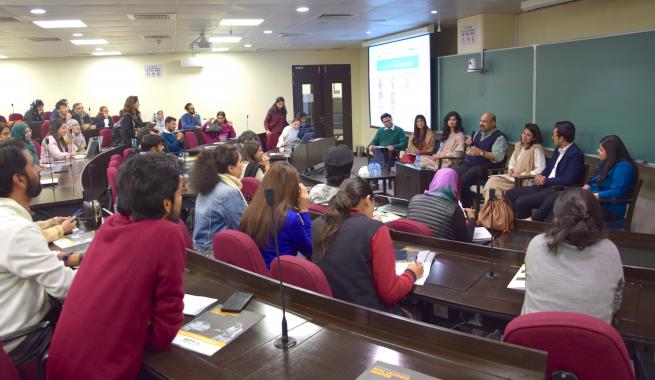
The Syed Ahsan Ali and Syed Maratib Ali School of Education (SOE) hosted an EduTalk titled, ‘From Classrooms to Systems’ with its organisational partner Teach for Pakistan (TFP) on January 30, 2020.
Dr. Faisal Bari, Director Academic Programmes, SOE, moderated the panel discussion featuring six current and former Fellows at Teach for Pakistan. The Fellows shared their experience of teaching in under-resourced government, non-profit and low cost private schools in Lahore and Islamabad. The panellists, Arooj Naveed Haq, Zubina Hafeez, Tooba Akhtar and Aan Asif Cheema, graduated from LUMS, while Ali Raza Jafri and Shajee Ahmed graduated from National University of Sciences and Technology and Ghulam Ishaq Khan Institute of Engineering Sciences and Technology, respectively. It was a packed event, attended by Dr. Arshad Ahmad, Vice Chancellor, LUMS, faculty members and students.
TFP Fellows shared their experience of witnessing the challenges faced by children who live and learn in poverty, and the subsequent impact on their learning abilities. Fellows Ms. Hafeez and Mr. Jafri spoke about domestic factors that affect the well-being of these students. They talked about the threat of early marriages and physical labour affecting academic performance. Mr. Ahmed and Ms. Haq also shared their experiences of dealing with problems including institutionalised corporal punishment practices in schools, and the academic gap faced by students in primary schools.
Having worked with students for nearly two years now, the Fellows discussed how the curriculum and assessment frameworks are oblivious to the real learning needs and on-ground challenges. The Fellows further discussed various misconceptions regarding Pakistan’s education crisis. While talking about the vilification of teachers as root of all learning problems, Ms. Naveed said, “It is impossible to paint people as black or white. The same teachers who carry sticks in their bags to beat children are also the ones who hold free after-school tuition in their communities.”
The Fellows discussed the various factors that set teachers up for failure. These included delays in the payment of salaries, inordinate number of administrative assignments that distract them from the core task of teaching, and limited resources and opportunities for professional development. The fellows also discussed another common misconception regarding the lack of interest showed by parents belonging to low income households. While negating this, Mr. Ahmed said that he cautiously reached out to parents asking for their support. Wanting to hold after-school remedial classes for his students in a Tarnol school, he was expecting backlash as most of his students work after school and the class would disrupt their work-schedule. However, parents wholeheartedly supported the initiative, waiting an hour or more to pick up their children. As a result of this collective effort, Mr. Ahmed's students passed their board exams with significantly better results. “When we get into this work, we think, ‘I can do this task and I know what is right’ but we need to believe in the power of the collective which includes the staff, the parents and the students,” shared Mr. Ahmed.
The Fellows infused hope in the audience regarding the education crisis by sharing examples of students making rapid academic growth, inculcating confidence and self-belief, thinking critically and using their voice to stand up against bullying and corporal punishment. The positive change manifested not just in the students but also in the Fellows. Most individuals who joined the Fellowship were not originally from the field of education but this exposure inspired them to take action and work towards changing the current state of affairs.
Teach For Pakistan’s ambition is to ensure that many more talented young people are able to access the Fellowship experience, and develop the understandings and leadership skills to drive scalable and systemic change in the long run. In recent years, the programme has become increasingly diverse to include future leaders who themselves have experienced educational inequity and injustice and want to ensure that Pakistan does better for the coming generation of children.









